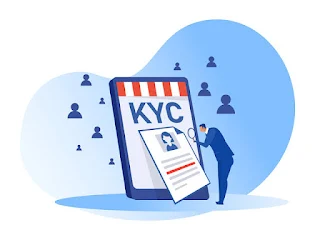KYC stands for "Know Your Customer." It is a regulatory and due diligence process that financial institutions, businesses, and organizations use to verify the identities of their customers or clients. The primary goals of KYC are to prevent illegal activities such as money laundering, fraud, and terrorist financing and to ensure the integrity and security of financial transactions. The KYC process typically involves collecting and verifying information about a customer's identity, including their name, address, date of birth, and official identification documents like passports or driver's licenses. The specific requirements and procedures for KYC compliance can vary depending on local regulations and the nature of the business or financial institution.
Why KYC is needed?
KYC (Know Your Customer) is needed for several important reasons:
1. **Preventing Fraud**: KYC helps verify the identity of customers, reducing the risk of fraudulent activities, including identity theft, account takeover, and financial fraud.
2. **Anti-Money Laundering (AML)**: It plays a crucial role in detecting and preventing money laundering, where criminals attempt to legitimize illegally obtained funds by moving them through the financial system.
3. **Counteracting Terrorist Financing**: KYC procedures are essential in identifying and stopping the flow of funds to terrorist organizations and individuals associated with terrorism.
4. **Compliance with Regulations**: Many governments and regulatory authorities require financial institutions to perform KYC as part of their legal obligations to combat financial crime and maintain the integrity of the financial system.
5. **Risk Management**: KYC helps financial institutions assess the risk associated with different customers, allowing them to tailor their services and monitoring to those risks.
6. **Protecting Reputation**: Stringent KYC practices can help protect an organization's reputation by demonstrating a commitment to ethical and legal business practices.
7. **Customer Security**: KYC safeguards the interests of legitimate customers by reducing the chances of unauthorized account access and fraudulent transactions.
8. **Data Privacy and Security**: Properly conducted KYC processes ensure that sensitive customer data is handled securely and in compliance with data protection laws.
9. **Enhancing Trust**: By reassuring customers that their financial institution takes security seriously, KYC practices can enhance trust and customer confidence.
10. **Global Standardization**: In an increasingly interconnected world, KYC helps standardize customer identification practices, making it more difficult for criminals to exploit weaknesses in the financial system.
In summary, KYC is a fundamental practice for financial institutions and businesses to maintain the security and integrity of their operations, protect against financial crimes, and comply with regulatory requirements. It serves as a critical line of defense in the fight against money laundering, fraud, and terrorism financing.
Where do I need to update my KYC?
The process and location for updating your KYC (Know Your Customer) information can vary depending on the institution or organization with which you have a financial relationship. Here are common places where you may need to update your KYC information:
1. **Bank or Financial Institution**: If you have a bank account or any financial products like a credit card or investment accounts, you may need to update your KYC details at your bank or financial institution. This is typically done by visiting a local branch, using their online banking platform, or contacting their customer service.
2. **Insurance Companies**: If you have insurance policies, you may need to update your KYC information with your insurance company. This can often be done through their website or by contacting their customer service.
3. **Stock Brokerage Firms**: If you have a brokerage account for buying and selling stocks or other securities, you may need to update your KYC information with your brokerage firm. This can usually be done online or by contacting your broker.
4. **Mobile Service Providers**: In some regions, mobile service providers may require KYC updates, especially for prepaid mobile services. You can typically visit their physical stores or use their online services to update your KYC details.
5. **Government Agencies**: In some cases, government agencies may require KYC updates for services such as passports or social security benefits. You would need to visit the relevant government office or use their online services for updates.
6. **Cryptocurrency Exchanges**: If you use cryptocurrency exchanges, they may have KYC requirements, and you would update your information through their platform.
7. **Online Payment Services**: Online payment services like PayPal or other e-wallets may require you to update your KYC information through their websites.
The specific process for updating your KYC information can vary, so it's best to check with the organization or institution directly. They will provide guidance on what documents or information you need to provide and how to complete the update, whether it's in person, online, or through customer support. Keep in mind that KYC requirements can change over time due to evolving regulations, so it's a good practice to periodically review and update your information as needed.
